
[ad_1]
Big renovations are exciting and fun, but it’s no secret that they can also be really stressful – especially when it’s one of those expensive, weeks-long, life-interrupting renovations like a kitchen or bathroom. Things go wrong, budgets get broken, timelines go haywire, and somehow there’s always dust everywhere. EVERYWHERE. So since we’ve renovated 7 houses over the past 17 years, we thought it might be helpful to share our best tips for preparing for & minimizing renovation stress.
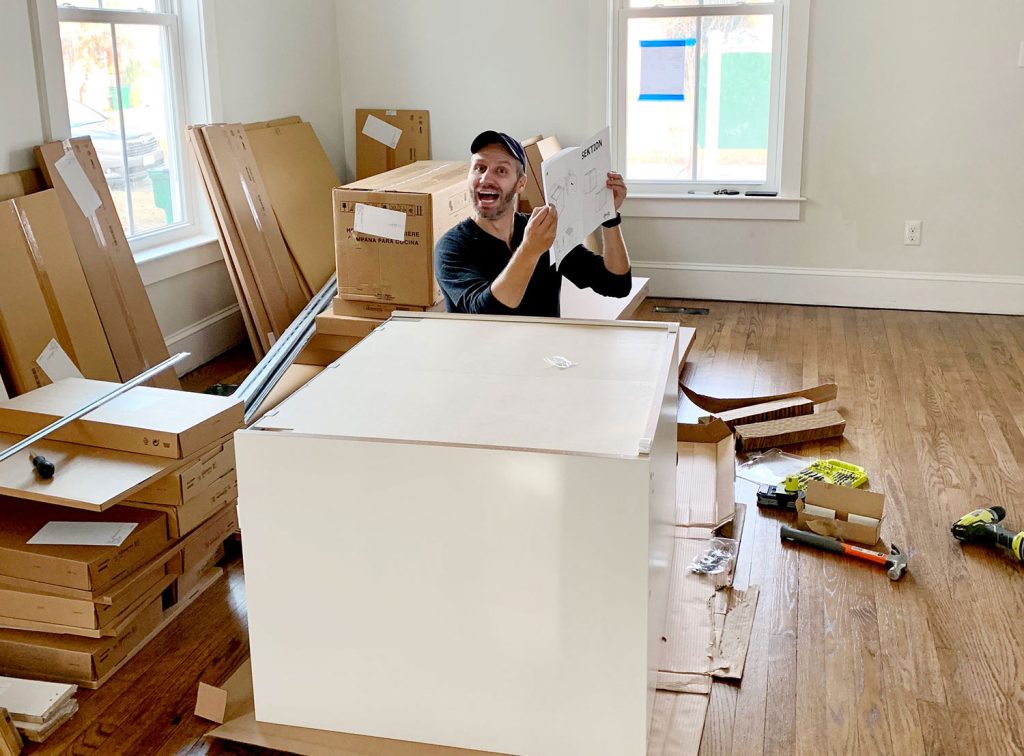
When planning a project it’s easy to only focus on the physical, financial, or logistical hurdles ahead of you. But today we’re going to talk a lot about mindset and other mental aspects of DIYing instead. Because in an ideal world, we’d all enjoy the process of renovating as much as the outcome. It’s not always easy, but here are some ways you can keep your cool when a project, budget, or timeline is boiling over.
Why Manage Renovation Stress?
Maybe this seems like an obvious question. We’d all like our renovations to be less stressful, right? But I don’t think we always take the time to consciously think about the stress-factor when we’re planning a project. We calculate our budgets, we check our calendars, we mood board and floor plan… but how many times have you been deliberate about identifying and minimizing your renovation stress points?
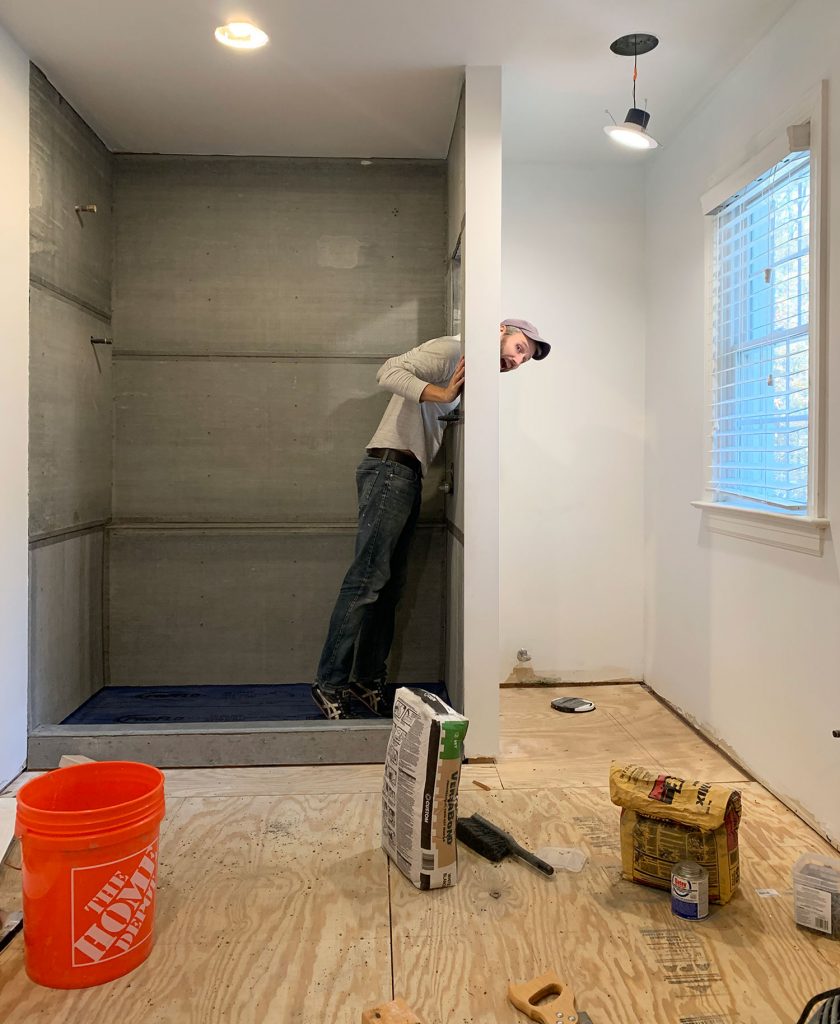
It took us many years and many renovations before we started thinking in those terms. A great example of a time that we made that thinking a priority was during the main bathroom renovation in our last house (above). We started that full-gut bathroom transformation in late 2019, immediately following 3 years of back-to-back beach house & duplex projects.
We loved those houses, but the process was draining and we were feeling more tired and sore than we had in our twenties and early thirties. So even for perpetual renovators like us, we could tell we were embarking on that bathroom before our “tanks” had fully recovered. We knew if we didn’t factor in some stress management, we’d be setting ourselves up for a rocky ride.
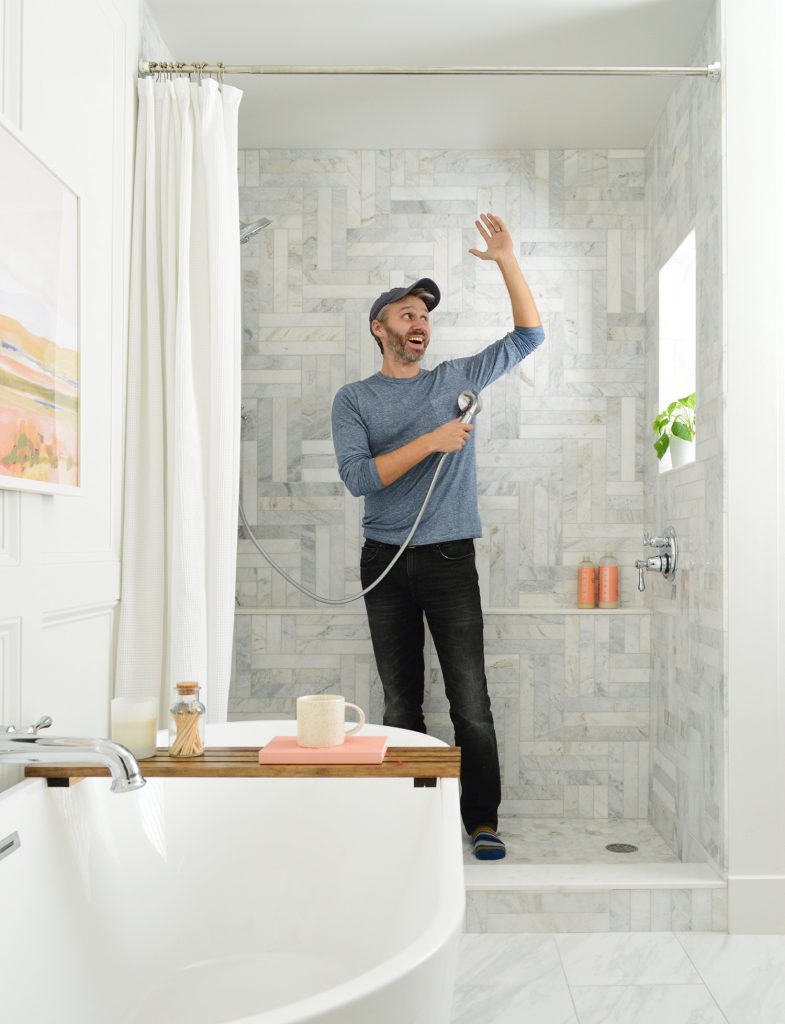
Sure, we could’ve delayed the bathroom project more (we had already waited 6 years) but we were excited to work on our main house again – and finally had a clear vision of what we wanted for our own bathroom. So we decided to consciously come up with a game plan for stress, just like we might plan any other element of the job. Here’s how we did that:
#1: Know Your Specific Stressors
Once we set the goal to minimize our stress, the next thing was to be very honest with ourselves about where it comes from. This will be unique to each person and each project. Of course, there are also some universal stressors – like a pipe bursting, a contractor ghosting you mid-project, or running short on a material that is suddenly and inexplicably on backorder. Those events fall under the umbrella of “things you can’t plan for or control” and it’s natural to feel stress when they happen.
So as we began our bathroom renovation, we acknowledged that we couldn’t expect it to be 100% stress–free. We’re not naive! Instead, we decided we would just try to take those stressful moments in stride (especially those beyond our control), and not let them spoil the whole project or make us feel like we’d failed at this mindset mission.
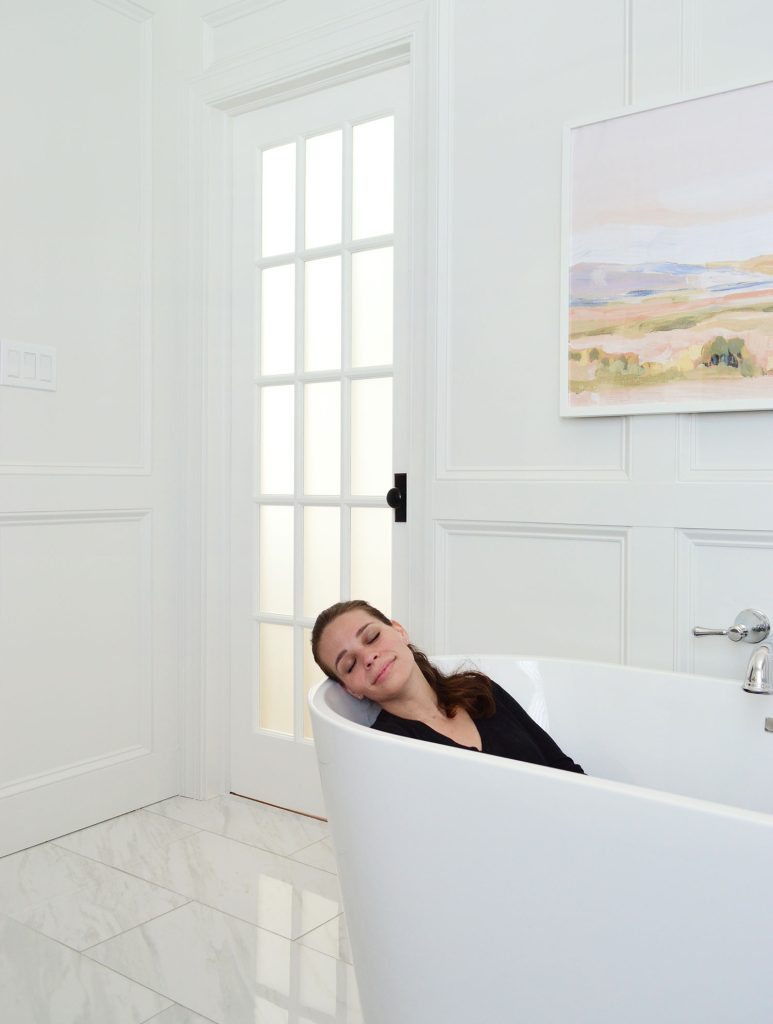
Beyond those out-of-our-control events, the three things we knew would be specific stressors for us were:
- Second-guessing a design choice
- Spending more than we had budgeted
- Timeline issues/a reno that takes longer than planned
These are probably things that many of you have worried about during home projects too. Listing them as obvious pitfalls upfront helped us think of specific ways to deal with them. Most of our solutions are mental, but some steered our physical decisions too.
Let’s get into the first stressor on our list: second-guessing a design choice.
#2: There Are Many Good Options – Not Just One
One thing I struggle with more than Sherry is second-guessing a decision. You know, like doubting a material choice or layout option. It’s the analytical part of my brain that feels the need to have seen and systematically evaluated allllllll of the possible outcomes before I can feel 100% confident in a choice.
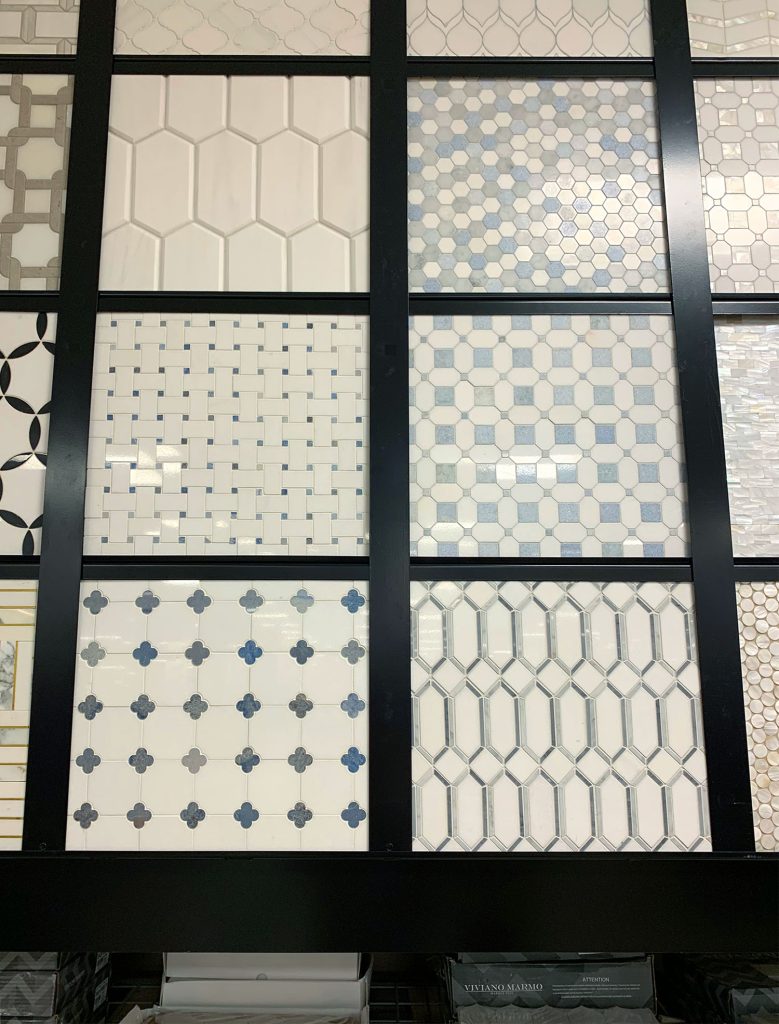
There are strengths to this approach, but in a world with endless tile choices and showerhead options, it sometimes feels impossible for me to trust a final decision. What if there was something better at that store we forgot to check or on the search page we didn’t click on? What if we spend all this time and money and don’t like it in the end? What if we find the better thing after it’s too late?
This doubt can also compound other stressors because you can waste more time being indecisive (there goes the timeline!) and you can even convince yourself that the more expensive thing must be the better thing (there goes the budget!).
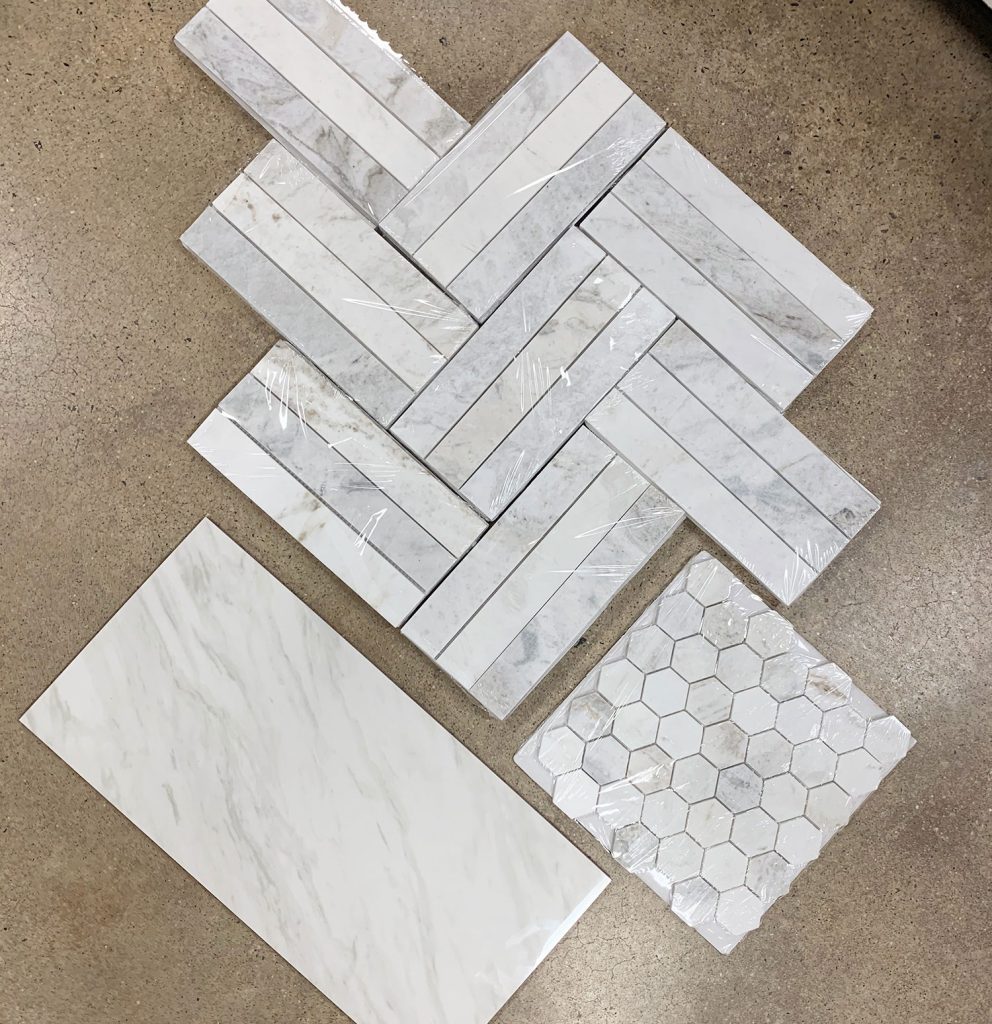
Right before we started this bathroom project, we talked with Miranda Anderson on our podcast about finding joy and patience while renovating. She discussed this exact thing. Her advice? Don’t let the possibility of finding something you love more, make you love the thing in front of you less.
Instead, I tried to consciously remember that there are LOTS of tiles out there that we’d likely be happy with. Shouldn’t we be grateful that we stumbled upon at least ONE of them? Can’t that be enough to feel good about making a decision? True story: we have never loved a tile more than the one pictured below that we landed on for our last house’s ensuite bathroom. But even if it was just one of our top 5 or 10 favorites (we have renovated a total of 14 bathrooms!!!!) – that is still a win. The comforting thought here is: there are multiple right answers.
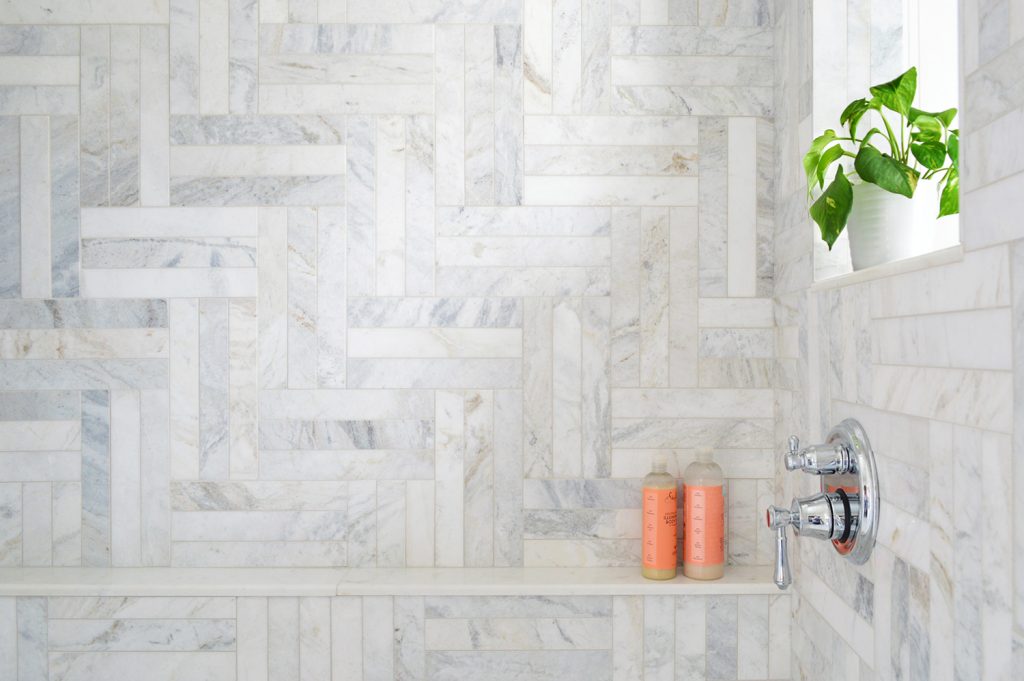
But how do you know when you love something? This comes easily for Sherry. When she falls in love with a rug or a light fixture, it’s an immediate instinct and she usually falls HARD for it (there’s usually petting involved). But my analytical nature can sometimes block me from trusting my emotional gut reactions. I may want to love something, but I can’t help cross-referencing all the technical considerations: Is the price right? Will it be durable over time? How will we get it home???
These are important questions to answer, yes, but they shouldn’t get in the way of feeling excited about a selection. So, as cheesy as it sounds, hearing that little pull of “ooh, this is nice” over that analytical voice in your head can help you make quicker and more confident decisions. That means less doubt, which can mean less stress.
Please don’t misunderstand this as saying you should “settle” or make speedy decisions for speed’s sake. But I’ve learned that taking more time and spinning more wheels doesn’t always get you a more “perfect” result. Sometimes overthinking is just that, and doesn’t really advance things in any meaningful way.
#3: Focus On The “Big Win” Of Your Project
Part of acknowledging that there are many good choices, is to also acknowledge that a renovation is usually a give and take. You can’t usually splurge in every single category, and on every single item. So sometimes buying a faucet that feels classic and nice wins over the one that takes your breath away (but so does the price). If the faucet is about to be the focal point of the room, it makes sense to splurge there and cut costs somewhere else – but sometimes you want the tile or the tub or the chandelier to be the star of the room and a faucet is just a faucet. Ya know?
It’s also extremely normal to learn something after the fact – like that you actually prefer an electric range to a gas one. We learned this exact thing after our previous house’s kitchen reno, where we went with a gas range/oven and found ourselves surprised that we missed our electric oven – and not just for a few days while we adjusted. The whole entire time.
This is not something to beat yourself up over and call the entire reno a failure. It’s a normal learning moment, and hopefully you can remind yourself that perfect is the enemy of good, and the entire upgraded kitchen as a whole is MUCH BETTER. Down the line if you ever need a new oven, you can get an electric one – but you can also google for gas oven cooking tips in the meantime and enjoy a delicious meal at your new quartz island on your new stools looking at your lovely backsplash…. which is exactly what we did.
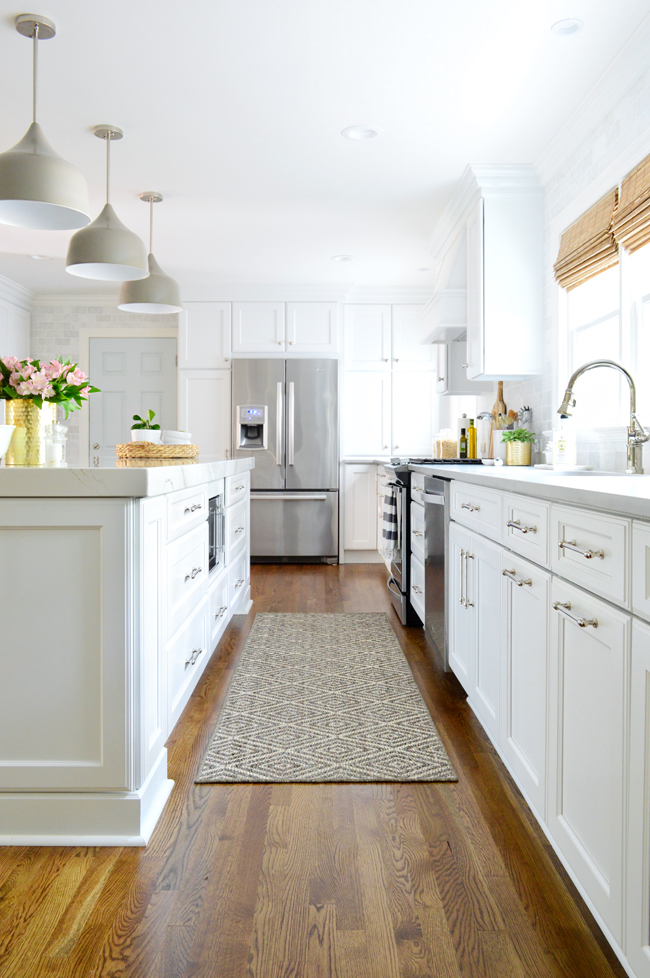
Right out of the gate, give yourself permission to misfire on some small decisions, as long as you still get your big win. (NOTE: we’re back to a fully electric stove in our current house’s kitchen and are very happy with it).
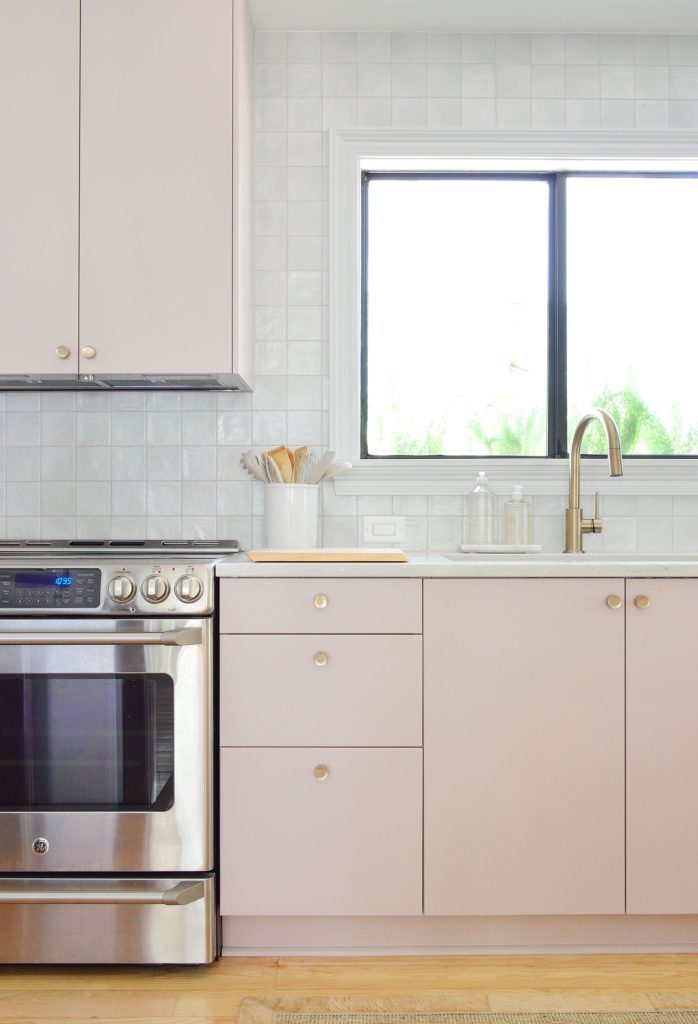
So to take a step back, it might be helpful before you even start a renovation to define your “big win.” For our previous house’s bathroom, it was a better layout (more on that here). At one point we even said to each other: “We’d be happy if nothing else changed in here except for taking down these walls to create a larger, more open bathroom.” Were there other things we wanted to change too? For sure! But it was IMMENSELY freeing to realize that the layout improvement was our #1 goal.
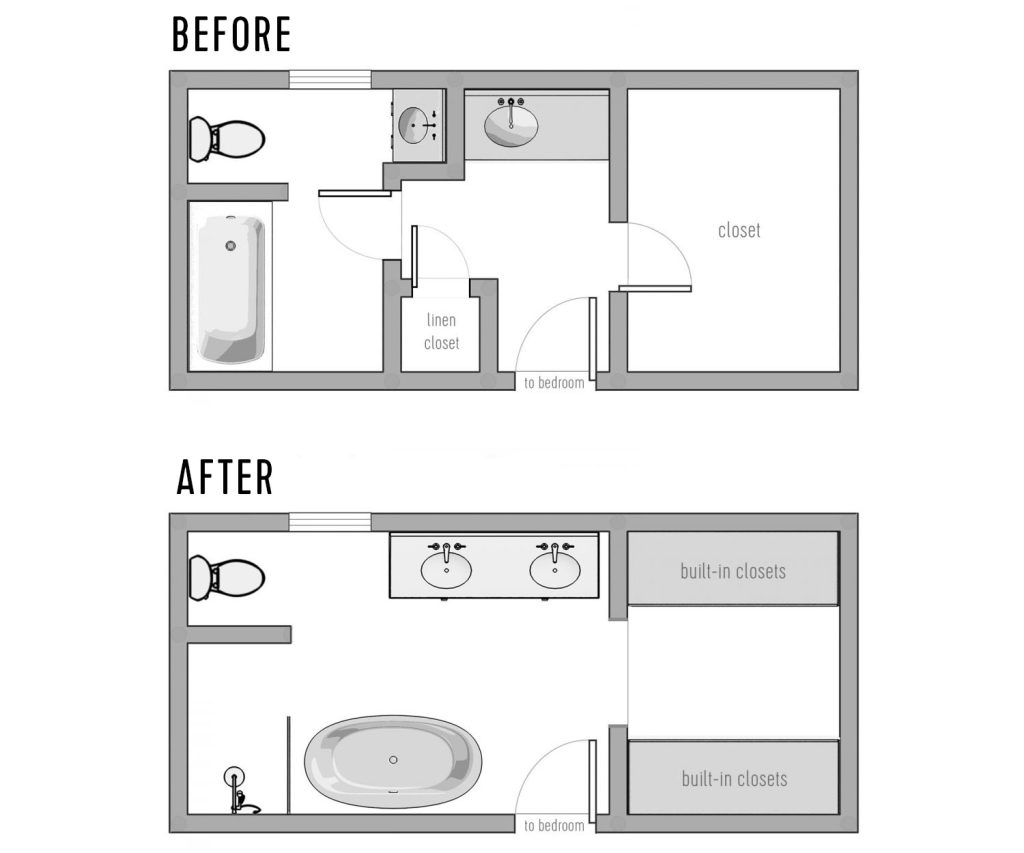
Knowing our top priority helped us focus our time and energy on that first and foremost. And once we finalized that part of the plan, it made everything else feel like icing. We get a better layout AND new tile! AND a better shower head! AND a prettier toilet!
By defining our “big win” ahead of time, we released pressure on expecting all the dozens of smaller decisions we were making in that room to be perfect. Surely we can’t expect every single one to be “the best” – that’s an impossible goal. So what if we saw ten fancier and more expensive tubs that we would’ve loved, but this one was “well rated and clean-lined and fine!” – we still got our better layout. And you know what, our simple budget-friendly tub ended up being great.
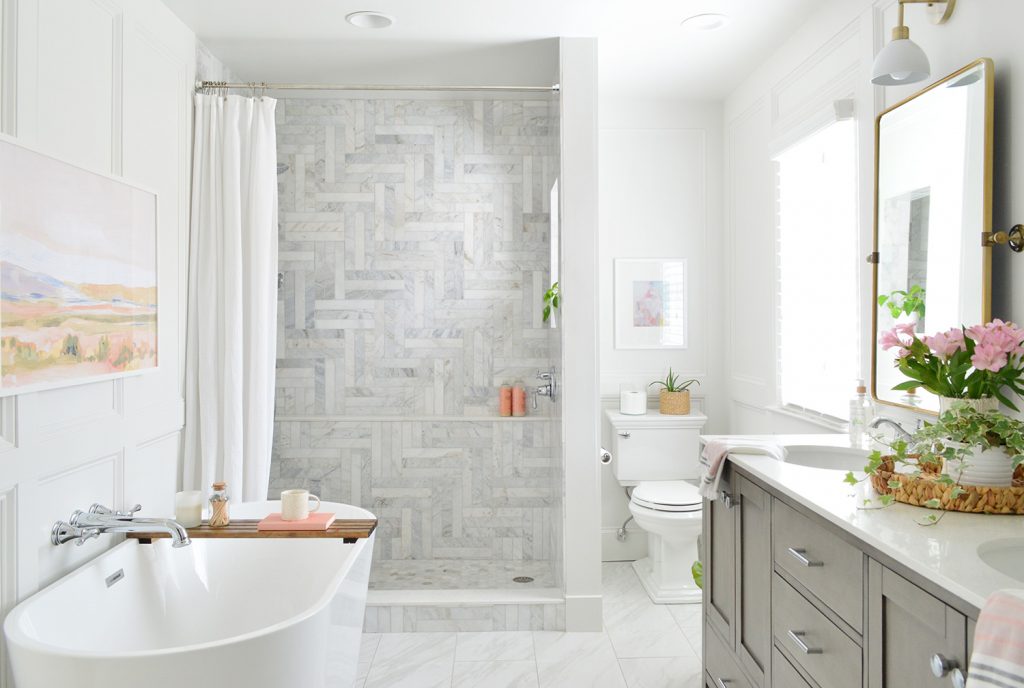
Again, it doesn’t mean allll of those many many reno and material decisions shouldn’t be taken seriously (or that it won’t be frustrating if they don’t work out). But focusing on the big picture, and that “big win” can really help keep excitement levels and morale higher throughout the ups & downs of a renovation.
#4: Don’t Equate More Money With Better Outcomes
Money is probably the #1 stressor during a renovation. And this simple truth deserves some serious attention if you’re heading into a renovation project: the more expensive thing isn’t always the better thing. Merely taking a deep breath and acknowledging this simple truth throughout every choice and step of the project, can keep you from blowing your budget… which prevents money from becoming a stressful part of your project. Major win, right?!
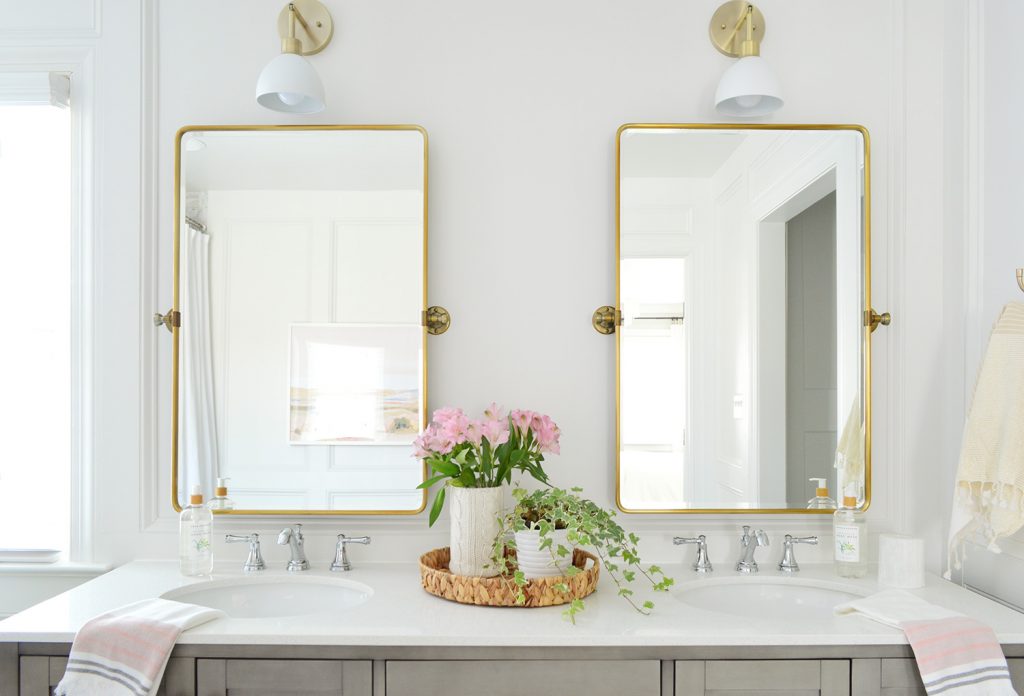
Leading up to our bathroom renovation, we probably would’ve told you that we were going to go ALL OUT. We’d waited and saved for 6 whole years to start it, so we thought it deserved to be one of those “treat yo’self” projects. We assumed we’d be tempted to splurge in a lot of places to make sure every last luxury was considered. After all, we didn’t want to regret cheaping out or not love the result.
But once it came time to actually start, we weren’t excited about spending extravagantly on this project. It’s hard to explain because it’s not like we were intentionally pinching pennies or hadn’t budgeted for splurges. We’ve just both felt in our core that we didn’t need to lean into the more expensive options at every turn (for example, we chose an off-the-shelf vanity that we loved versus something custom). After many many years of pining after heated floors, we learned it would be about $1000+ and we both just felt deeply in our gut that it didn’t feel worth it for us, so we skipped right past it. It was an indulgence we’d always assumed we’d spring for when the time came, but ultimately we weren’t convinced it would make us any happier in the end.
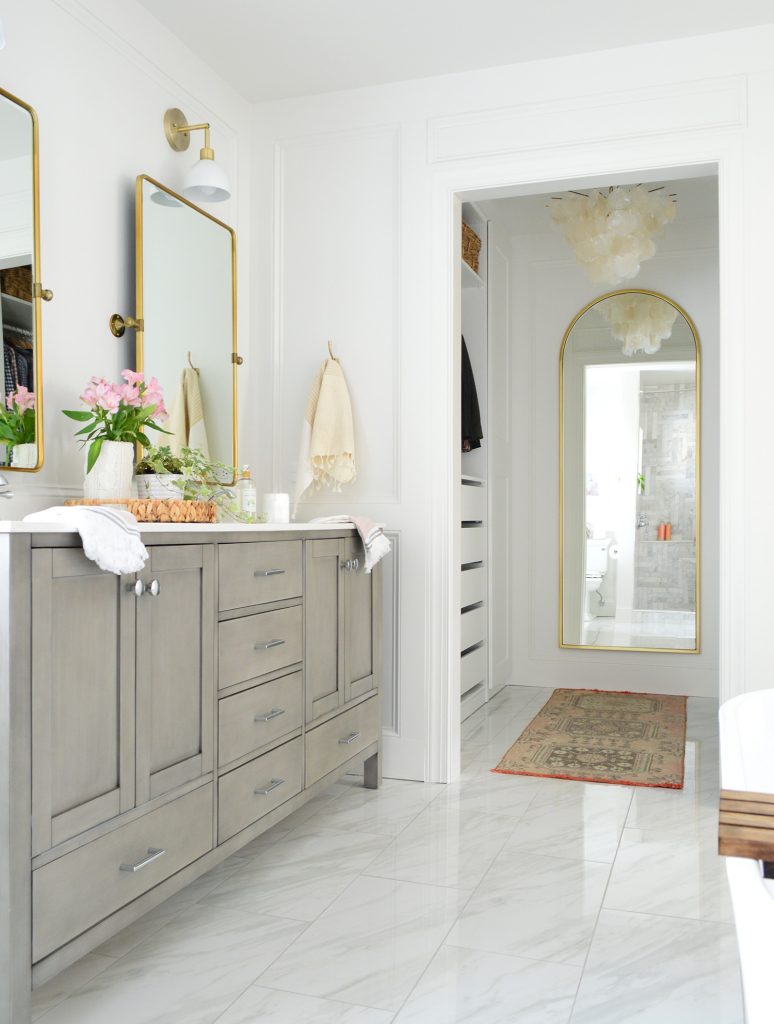
We can’t express how much peace it brought us during that project knowing we weren’t maxing out the budget. We had some padding in case something went wrong (or in case we came across a splurge we just couldn’t pass up), which made things feel palpably less stressful. It also alleviated the pressure on many of our choices being perfect (ex: “if that chandelier ends up being the wrong brass finish, at least I didn’t blow my budget on it and it’s returnable versus something custom“).
My main point here is: if you know that sticking to a specific budget is one of your big stress points, find ways to attempt to mentally unlink “spending more” with “a better outcome.” That’s not to say you shouldn’t splurge or treat yourself when you can afford it and deeply want something, but remember there are so many choices in a renovation (dozens! maybe even a hundred!). So feeling pressure to get the most fantastic (and expensive) thing at every turn can quickly become a budgeting nightmare. It really is a smart and helpful strategy to get extremely intentional about what matters most to you (maybe you want to splurge on the tile) and what doesn’t (simple glass pendants can be beautiful and budget-friendly).
#5: Stop The Ticking Clock
Besides budgets, blown timelines are probably the other most common stressor in a renovation. And, unfortunately, it HAPPENS ALL OF THE TIME in the renovation world. Materials get delayed, contractors don’t show up, and things just take longer than expected. You’d think we’d be used to it by now (after almost two decades of rolling renovations!), but it’s hard not to hear the ticking clock in your head when your bathroom or kitchen is utterly unusable.
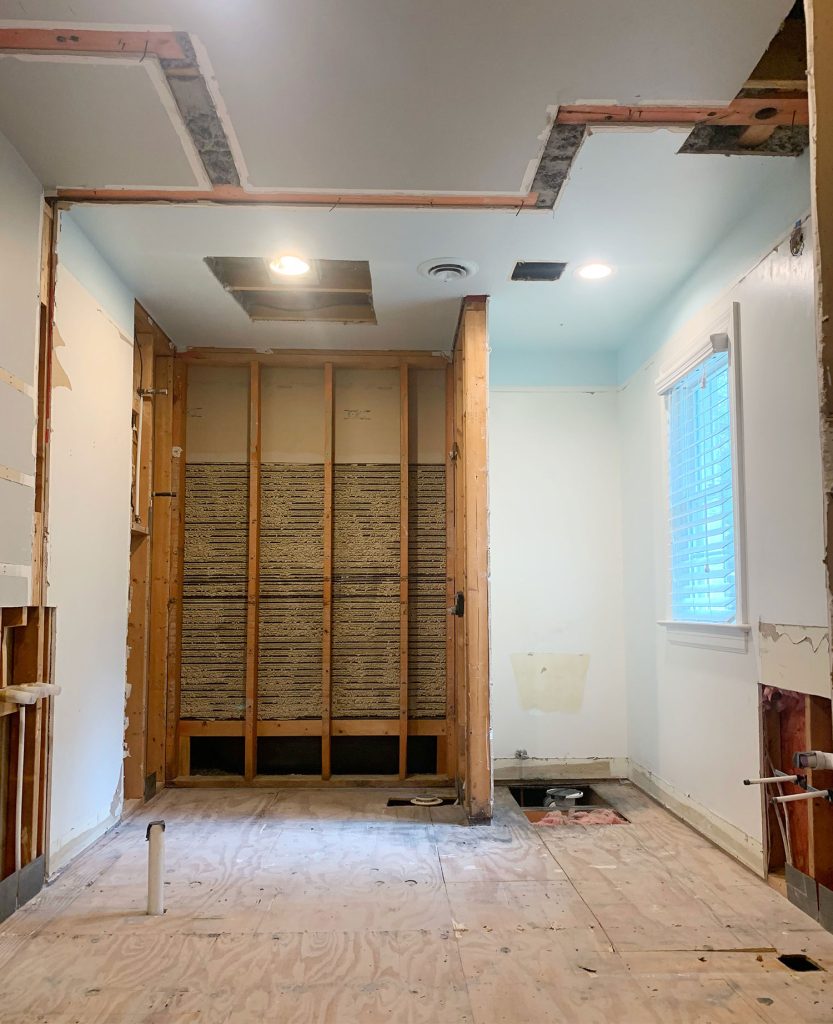
Let’s revisit our last house’s bathroom reno again. It started off great. We had a productive week of demo and then back-to-back plumbing and electrical visits. But we hit a scheduling issue with our drywall guy (which, ironically, was a task we hired out as a “treat” to ourselves). Nothing got done for almost 10 days. It had the potential to really frustrate us, but instead we took a moment to put the whole thing into perspective. Here was our thought process:
Did we have a deadline for this project? No, not really. We wanted it done sooner than later, but there was no hard date we needed to hit.
Why did we want it done fast? Mostly we were eager to have a functioning (and not-dusty) bathroom attached to our bedroom again. But we had a hall bathroom just steps away that we could use, so it wasn’t too inconvenient. Especially when we took a second to remember that during our first house’s bathroom reno, our ONLY full bathroom was gutted. As in, we had no shower in our house for several weeks (gym showers for the win). Making that comparison in our heads reminded us that this circumstance was certainly a lot less urgent.
What could be done to make it go faster? Hiring tasks out didn’t necessarily equal speedier results (as the drywall issue proved) so the next best solution would have been jumping in & working faster ourselves. But that would have meant more late nights and/or falling behind on other work and life commitments…
Did we want to work more late nights and fall behind on other commitments? No! At least not to get our bathroom done sooner. That sounded like a much more stressful and exhausting path and, like we said upfront, we really wanted to enjoy the process of this reno, not just the outcome.
Pausing to question ourselves in this thoughtful and intentional way helped us realize that the bathroom delays weren’t actually that big of a deal. We weren’t missing a deadline. We weren’t burning money. We were (understandably) tired of a dusty room we couldn’t use and nothing getting done for 10 days straight – but it really was not the end of the world. Suddenly the timeline seemed like an unnecessary thing to stress about.
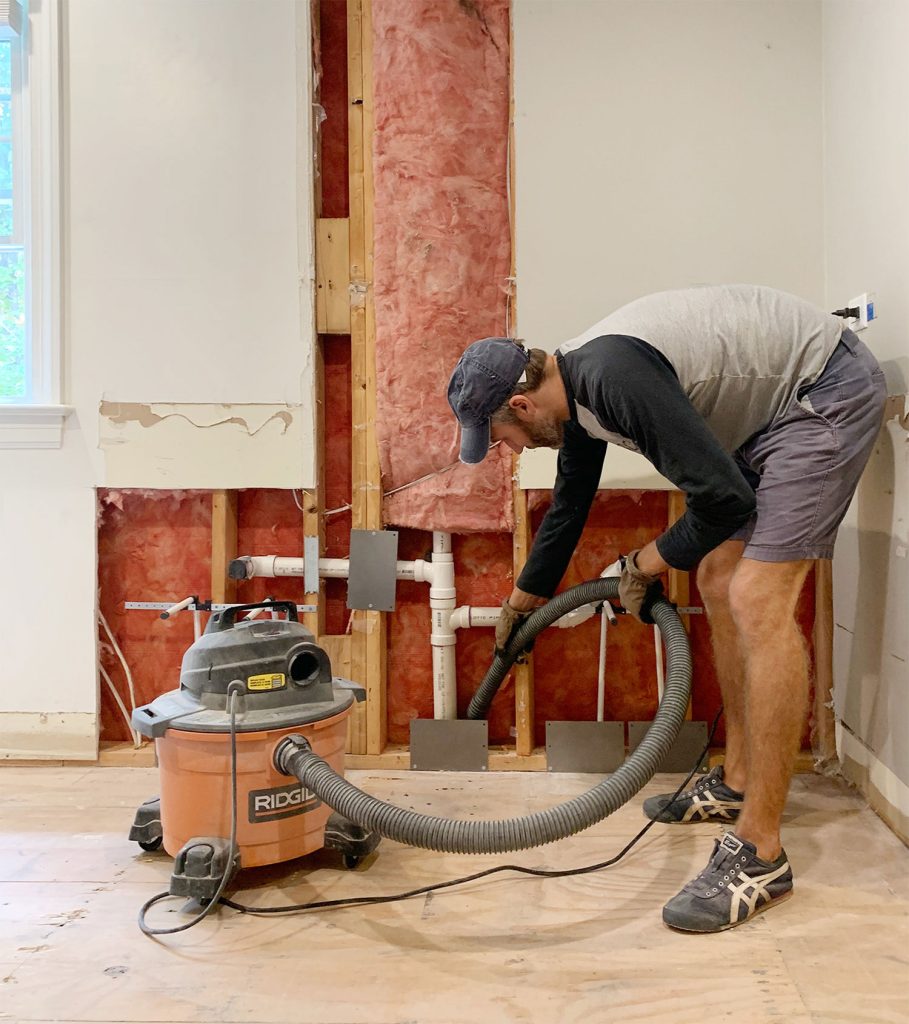
Of course, it’s not always so easy to brush off timeline issues. Renovations can have very firm and important deadlines, delays may end up costing money, and it can be draining when a project feels never-ending. But if you can exercise whatever power you have to NOT put a ticking clock on your project, it often can be a mental load off. You might even want to consider delaying a project (literally don’t start it) with a tight or immovable deadline (like family coming to stay for an upcoming holiday).
Often waiting until they leave and there is no deadline can be so much easier (they don’t care if it’s an old bathroom – they’re coming to see you, not the toilet!). You also might want to let go of elements that could cause delays (like if a heated floor is $1000 more and would add an extra week, just think through if that’s a non-negotiable or something you might not even use that much). Also, double-checking the contractor’s timeline in your head (or with them) can add some really good peace of mind.
This is the stressor that’s probably most unavoidable in any renovation, so sometimes it’s just as simple as acknowledging that it’s likely to happen upfront, so you’re less caught off guard if and when it occurs.
Managing Renovation Stress: A Summary

Again, every renovation and renovator is different, so there isn’t one foolproof formula for minimizing stress during a home project. But to recap, here are some things that we find helpful:
- Identify your potential stressors and make a plan upfront to account for them
- Remember there are many good choices – not just one
- Don’t let perfect be the enemy of good
- Focus on the “big win” of your project to keep little hiccups in perspective
- Remember that bigger budgets don’t always mean better outcomes
- Remove as many time constraints as possible to cushion inevitable delays
Lastly, don’t beat yourself up when a project gets stressful. Every big project has ups and downs, so it’s only natural to feel big feelings – no matter how hard you try to plan for them ahead of time.
NOTE: You can also hear us discuss this topic and these tips in our podcast, Episode #156.
More posts from Young House Love
[ad_2]
Source link






